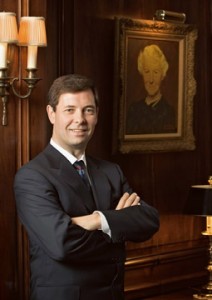Because of its reputation as a high caliber music institution, the Eastman School of Music is able to host some of the top music professionals for both master classes and discussions. This past weekend on Sunday, Feb. 24, Eastman hosted violist Roberto Diaz, CEO and president of the Curtis Institute of Music, one of the top music conservatories in the world.
After hosting both viola and chamber music master classes, Diaz offered an hour of his time to give a talk to the Arts Leadership Program students and the rest of the Eastman community. He started the discussion by telling the audience a little about his background as a musician. Born and raised in Chile, he moved to the United States in high school where his father, a successful violinist, took a job with a local orchestra.
After high school, Diaz completed his undergraduate studies at the New England Conservatory and his master’s degree at Curtis. He then traveled around the country and played in many major orchestras.
One of his biggest messages to the audience, which was full of young, aspiring musicians as well as already successful professors, was to always do what you love. He talked about all of the ensembles and teaching jobs he did while playing in major orchestras.
“I always had an interest that went beyond the [orchestra] job,” he said. “You can leave something that’s not rewarding because there are so many other things going on.”
He talked about how many musicians, or professionals in any field, find a secure job soon after graduating from college and stay in that job for a long time because it’s safe.
“If you get one of these jobs,” he said, “What else are you going to do with your life? The happiest people in the world are those with varied interests.”
He told of the day a co-worker asked him in a meeting what top-musicians at Curtis were lacking. His response? Curiosity. From an early age, they are pushed to be the best, he explained. “You have these people who are incredibly proficient in music with no feelings about it.”
When asked what musicians need to do to survive in today’s economy, Diaz had a simple answer: “Resourceful musicians find ways to present themselves in non-traditional ways to non-traditional concert audiences.”
That, in his opinion, is the way that classical music will thrive in our society. He also told students to have faith in their abilities.
“If [you] graduate with skills and an open mind, you’re going to be ok,” he said. “If you can do [music] well, you can find a way to do it.”
The best way to be successful, in Diaz’s opinion, is to take chances. “You’re clinging to a tree and a rope swings by,” he explained. “If you grab the rope and have premier performance abilities, you’ll be fine. I’m sure of it.”
Sanguinetti is a member of the class of 2015.



